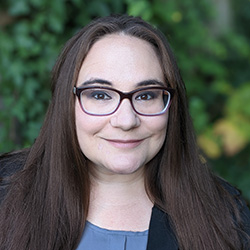How to become a nurse in Pennsylvania
No two days are the same when you work in nursing. It’s a fast-paced career that challenges you to grow, and there’s always more to learn. But what most nurses say keeps them coming back to work year after year is the feeling of making a positive impact on others’ lives when they’re at their most vulnerable. Does this sound like something you could do?
Says Allison Brophy, a BSN registered nurse at Penn Medicine, Hospital at the University of Pennsylvania, “There’s a drastic difference between being a nursing student and being a nurse. In nursing school it’s all about performing well on exams and proving you can think critically on theoretical cases. Once you are a bedside nurse, you are working with real people and any mistake you make has real repercussions.” While she loves the challenge and working with people, she adds, “it is a lot of pressure and it can be hard to cope. Some people say we’re lucky because we never have to work from home, but that doesn’t mean we don’t take work home with us.” Especially in a state like Pennsylvania where the employment level for nurses is so high.
Pennsylvania needs nurses says the Allentown newspaper, The Morning Call, and the career outlook for nurses in Pennsylvania looks good. In fact, the U.S. Bureau of Labor Statistics says Pennsylvania has the fifth highest employment level for registered nurses in the country, after California, New York, Texas and Florida.
There are 85 different state-approved RN programs to choose from in the state of Pennsylvania. This includes 15 different nursing diploma programs, which offers nurses the chance to learn in a hospital setting. Programs like these were the norm once upon a time, but are now a rarity that’s been phased out in favor of a college setting.
Even with nurse shortages, pandemics and the daily unknowns that face nurses in general, Brophy never regrets her decision to become a Pennsylvania nurse, saying, “Nursing is an amazing profession. It is so fulfilling because you are impacting people’s lives every day you show up to work.”
Nevertheless she adds, “It is important to be patient with yourself and seek support from fellow coworkers. Many people do not understand what goes on within the walls of a hospital unless they work there themselves, so it’s important to find those people you can go to
who truly understand and can be there for you through it all.”
8 steps to becoming a nurse in Pennsylvania
Are you ready to learn more about how you can start earning your nursing degree? There are eight specific steps you must take to become a registered nurse (RN) in Pennsylvania.
Choose a nursing path.

As you consider which one is the best fit for you, keep in mind factors like the work environment you think you’d like best, the populations you’d most like to serve and where you hope your career trajectory will take you.
Some nursing programs are designed specifically for students who have an interest in a nursing specialty such as midwifery or hospice care. Others may cater to students who also work a full time and need to take classes in the evening.
Every program and college is different, so it’s important that you consider the pros and cons of each one carefully. Choosing the best fit now will lead to better outcomes as you move through your nursing program.
Earn your ADN or BSN.

In order to become a registered nurse in Pennsylvania, you need either an Associate Degree in Nursing (ADN) or a Bachelor of Science in Nursing (BSN). If you are interested in entering the workforce quickly, the two-year ADN may be the best degree choice for you. The BSN, a four-year degree program, focuses on the same clinical skills as the ADN, but places emphasis on nursing leadership and more complex levels of care.
Take the NCLEX-RN or the State Board Test Pool Exam.

After you’ve graduated with a nursing degree, you’re ready to sit for a comprehensive nursing exam. Students in Pennsylvania can take either the NCLEX-RN exam or the State Board Test Pool Exam (SBTPE).
These tests are designed to validate your skills as an entry-level nurse. In order to earn licensure in Pennsylvania, you’ll need to pass one of these.
Complete Continuing Education Credits in Child Abuse & Reporting.

In order to obtain their initial licensure, all new nurses must complete three hours of Board-approved continuing education in child abuse recognition and reporting.
Get licensed in Pennsylvania.

All nurses need to be licensed through the state nursing board in order to practice. In order to satisfy the requirements for a nursing license, nursing graduates must pass a board-approved nursing exam and submit a federal and civilian background check to the Pennsylvania State Board of Nursing (PSBN).
Find a nursing job.

Now that you’ve passed your exam and received your nursing license, you’re ready to slip into some scrubs and get to work. The PSBN allows graduate nurses to apply for a temporary nursing credential while they await their nursing exam results. If this is of interest to you, simply elect to pay the $70 license fee when you submit your application to take the exam.
You may consider working at a school, nonprofit organization, military base, nursing home, private practice, clinic or hospital.
According to data from the BLS, Philadelphia nurses earn the highest median salary, followed by Waynesborough and Bethlehem. To start your career at the most competitive pay, consider beginning your search in these metropolitan areas.
Keep up with continuing education.

Registered nurses in Pennsylvania must complete 30 continuing education units to be eligible to renew their license. The RN licensure period is from November 1 of odd numbered years through October 31 of the following odd numbered year. An example would be November 1, 2021 to October 31, 2023.
CEUs are a common requirement for license renewal in many states. Taking supplemental courses gives nurses the opportunity to explore other specialties in healthcare. It also ensures you’re keeping up-to-date on the latest advancements in care and treatment techniques.
As an example, Brophy chose to specialize in neonatal nursing, a choice she does not regret, saying, “I love the camaraderie of the nurses I work with. I am constantly supported by the more senior nurses in my unit, which
has helped me build my confidence at the bedside. I also love working with families and seeing the progress a patient can make going from a 400 gram micropreemie to a fully-grown, stable infant.” But, there is not always good without the challenging as she admits, “The hardest part can be walking into a shift with no idea of what to expect.”
“There is such a range of acuity in my unit—I could walk in and have a three-patient assignment that is relatively
stable with kids reaching their discharge date, or I could be on admission and stabilizing a very sick infant.”
Maximize your potential.

Continuing your education in the form of a higher degree program is a great way to satisfy your license renewal requirements and advance your career as a nurse in Pennsylvania. Not only that, but additional credentials may lead to an increase in annual nursing salaries or may offer greater opportunities for advancement.
Acquiring an RN license in Pennsylvania
The PSBN is the regulating body that licenses and certifies nurses in the state. In order to begin the process, nurses in Pennsylvania first need to apply for an Authorization To Test from the SBN. The NCLEX-RN results will be sent to the nursing board once they’ve been processed.
The Pennsylvania Board of Nursing advises students to begin the process of licensure prior to graduation. Nursing students will find information about state background checks on the Pennsylvania Access to Criminal History (PATCH) website. For details about registering for FBI fingerprint clearance, Pennsylvania nurses can check on the Board of Licensing page.
How long does it take to become a nurse in Pennsylvania?
In order to apply to a nursing program, students will need to first be accepted to, and have completed prerequisite credits at, the college of their choice.
The timeline can vary depending on the program you choose, its focus, cadence and your status as a full or part-time student.
That said, you can expect to complete your associate or bachelor degree anywhere between 30 months to five years.
After graduation from a two- or four-year program, nurses will begin the process of applying for licensure. This can be done online and should take one to two hours at most. The PSNB will release an authorization to test (ATT) upon approval; students need this to register for the NCLEX.
There can be a wait of anywhere from 30 to 60 days between graduation and sitting for their NCLEX-RN exam. Brophy says she “graduated in August and the first date I was able to sit for the exam was October. I got my results two days after taking the NCLEX.” Students in Pennsylvania can begin applying for a job at this time, however, and may provide their licensing application number for reference.
Nurses who don’t pass can retake the exam after 45 days. Once a nurse has passed their NCLEX, it should take six weeks to receive their official results. At this point, they’re ready to complete their application for licensing.
Continuing education
Most states require nurses to continue their education in order to renew their nursing license, and Pennsylvania is no exception. The courses you’re expected to take aren’t nearly as time intensive as completing a degree.
Continuing Education or Continuing Education Units must be completed by an organization authorized by the Pennsylvania Board of Nursing. These classes cover a wide range of topics and are designed to enrich your ability to provide care that fits the unique needs of the community you serve.
Registered nurses can also pursue academic programs. Certificates and degrees offered through accredited programs can also be counted toward license renewal requirements, and are weighted more heavily. They may also be leveraged to earn increases in salary or better job titles.
Understanding accreditation
It’s important to choose a program that’s accredited by either the Commission on Collegiate Nursing Education (CCNE) or the Accreditation Commission for Education in Nursing (ACEN).
Accreditation ensures that the course content you’re studying is current on the latest technological and medical advances in your field. It also guarantees your eligibility to apply for financial aid, and provides you with security if you ever need to transfer credits to a different institution.
Common degree paths for nurses that are looking to advance include bachelor’s and master’s degrees. These degree programs will focus on more specialized knowledge, leadership-oriented roles and research.
Is Pennsylvania a compact state?
Yes, Pennsylvania is a member of the Nursing Licensure Compact (NLC). This means that nurses licensed in this state are automatically licensed to practice in other states that participate in the compact.
Nurses who receive initial licensure in a compact state can travel or transfer to participating states without obtaining additional licensure. They’re also qualified to treat patients virtually via phone or video chat.
Job outlook for Pennsylvania nurses
The U.S. Bureau of Labor Statistics (BLS) expects the number of nursing jobs to grow by 6% through 2032 in Pennsylvania, but O*Net, a subsidiary of the BLS, estimates that growth is more likely to be closer to 9%. That’s higher than the expected growth for registered nurses nationwide, which is on track to increase by 5.6% through 2032.
Median annual salaries
The annual median wage for registered nurses in Pennsylvania is just slightly below the national median according to the U.S. Bureau of Labor Statistics (BLS). Pennsylvania’s lower cost of living means that even nurses who are just starting out should find they’re making a comfortable wage.
Here are median annual salaries for the state as a whole and for some of the top metro areas in the state:
Find out how to become a nurse in your state
The process of becoming a nurse is different depending on the state in which you are seeking licensure. Each state has different requirements and standards that you should be aware of.
Here are some of the top nursing states in the U.S. and the steps to become a nurse in each:
Useful resources
The Pennsylvania Association of Practical Nursing Administrators is an organization that endeavors to advance the profession of practical nursing in the state.
The Pennsylvania State Board of Nursing is the licensing authority for nurses in the state of Pennsylvania. Healthcare workers can apply for and renew their licenses online through this site.
NCSBN is a not-for-profit organization whose U.S. members include the nursing regulatory bodies in the 50 states, the District of Columbia and four U.S. territories. It is the developer and owner of all NCLEX exams.
NCLEX, which stands for the National Council Licensure Examination [for] Registered Nurses (RN), is a computer adaptive test nursing graduates are required to pass in order to be licensed as a Registered Nurse in the U.S. and Canada.
The National Student Nurses’ Association has been mentoring U.S. nursing students since 1952. They assist students with their initial licensure as Registered Nurses and continue to promote professional development in working nurses.


With professional insights from:
Penn Medicine, Hospital of the University of Pennsylvania




